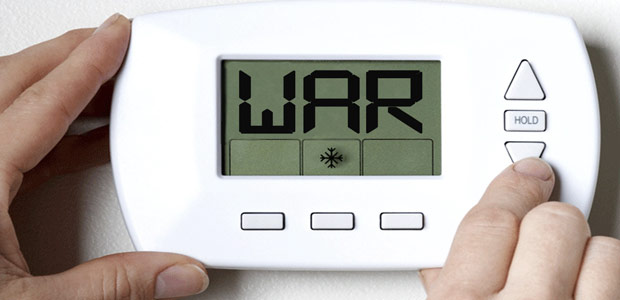
Do you ever find yourself in a war with your spouse or significant other over wasteful habits? (Image: Good Mythical Morning)
On cold winter nights, I would sometimes find my wife huddling on the toilet with her hair dryer lying on the floor next to her feet (I’m not making this up). My wife’s wasteful habit is using 1500 watts of high-velocity hot air to warm her toes.
While I salute the creativity of her solution, I experience the loss of each one of those watts like the passing of a family pet. So I retreat immediately to find one of the four pairs of insulated slippers I’ve bought for her, and beg her to end this pointless waste, not to mention the slaughter of innocent electrons.
My Wife’s Wasteful Habits Don’t Stop There
I shut off the running water while she’s brushing her teeth. She complains about the low-flow shower head. I harangue her about turning off the lights when she leaves a room. She’s completely fed up with trash sorting and leaves anything that could conceivably be recycled lying in various squirrel-like caches around our house. I start to close the refrigerator door if she’s been staring into it for more than 20 seconds. She turns the thermostat up and I turn it down. Back and forth it goes…
Though our waste and energy war at home may continue indefinitely, I’ve found a way to make a living from my condition, and I’m pleased to report that it’s not as a circus sideshow act. It’s probably what saves our marriage, and possibly my neck.
Changing Human Behavior Is My Passion

Environmental Crime Scene – Small plugged in electrical appliances waste energy even when they are not in use (Image: courtesy of Mike Walker)
My first job at the U.S. Environmental Protection Agency posed the following challenge: How can we get Americans to care enough about the second leading cause of lung cancer to place a $15 radon test kit in their home? I was hooked! I helped to convince people it was easy, inexpensive and could potentially save their lives.
I now run a Boston-based consulting firm, called AlterAction. Dedicated to changing human behavior on a large-scale, we brainstorm creative ways to show people (and organizations) how to save electricity, drive more efficient vehicles, and overall be less wasteful.
I look forward to sharing some of the things I’ve learned over the past 25 years about changing the wasteful habits of humans with the WeHateToWaste community going forward.
Wasteful Habits Inspire Meaningful Solutions
I know what you’re really wondering, though: Is my wife still using a 1500-watt hair dryer to warm her feet? The answer, thankfully, is very rarely. What worked is one of the classic tricks of the trade: changing the context in which the behavior took place.
![]() What that means is, I simply place one of the aforementioned four pairs of toasty-warm slippers near her hair dryer. Now, whenever she’s tempted, she has an alternative staring her in the face (or feet?) – an alternative with a very appealing side benefit – it preempts my grousing.
What that means is, I simply place one of the aforementioned four pairs of toasty-warm slippers near her hair dryer. Now, whenever she’s tempted, she has an alternative staring her in the face (or feet?) – an alternative with a very appealing side benefit – it preempts my grousing.
While I confess that I’m hypersensitive to wasteful habits at work and at home, I hope that my wife will forgive me and find room in her heart to tolerate my affliction for many more years to come. If there are other husbands and wives out there suffering from my “condition,” please don’t be afraid to tame your wasteful spouse as I have done. Please share your own creative strategies with the rest of us below.
Posting Guideline – Opinions expressed are solely those of the contributors and implies no endorsement by WeHateToWaste. Stories published on WeHateToWaste.com are intended to prompt productive conversations about practical solutions for preventing waste. Please issue your comments accordingly.




Obviously the marriage has yet to stand the test of time or compromise.
When I first met my significant other I was shocked and taken aback by her wasteful ways! Plastic bottles were easily disposed of, cling wrap covered the leftovers of every meal, cardboard was thrown in the trash with everything else. It was not until I led by example that she began to follow suit.
Or perhaps it was the other way round…
Needless to say I focus a lot more on reusing and recycling since I met her.
Great post – one that I connect with 😉
It takes 66 days for a new habit to form!
http://www.huffingtonpost.com/james-clear/forming-new-habits_b_5104807.html
I find that for me, it’s just an awareness issue – my family, housemates and significant other just never gave a second thought to leaving the lights on, water running or not recycling properly. For many people, they are not even aware that they are being wasteful. I find that just alerting them to the fact they are being wasteful is enough to prompt some behaviour change (in a friendly way!).
Another effective strategy I use is to make recycling as easy and convenient as possible. I have placed two bins next to our trash can (one for paper and the other for metal, plastic etc). and then stuck a sign on the wall detailing what items can and cannot be placed in each bin. My housemates have told me they didn’t even realise so much could be recycled and now they often ask me which bin to place something in if they aren’t sure! I have now successfully converted my Parisian housemate who had never recycled in her life into a recycling guru!
In the last 4 years, I have had the pleasure of living with roommates who recycled religiously and were adamant about conserving energy in our home. Collectively as millennials, we are being more educated on how we can conserve, and the reasons on why we should do so. I think if you asked all my roommates why they developed their “green” habits, they would have the same answer and that is to waste less and preserve what we are privileged enough to have today for future generations. As I look back, the influence and work of my environmental mentors showed me how to live a more sustainable lifestyle. The concept of an eco-mentorship is happening all around as we speak between individuals; for example Mike and his wife, and between Beth and her Parisian housemate. I wonder if the role of eco-mentorship could become a formal designation in companies and governments for those who develop relationships based on bettering environmental practices.
When I was growing up, my mom kept the thermostat at 55. I would be freezing as I got ready for school. I dressed in front of a heater and I’d sneak the dial up by a few degrees whenever I had the chance. But once that monster of a boiler kicked into action down in the basement, it was no secret that someone had messed with the thermostat. For our family, we couldn’t afford to waste because oil was so expensive. Now that my husband and I are homeowners, I find myself doing exactly what my mom did. At almost $4.00 a gallon for heating oil, every degree makes a difference. For me, 60 is just fine. Not everyone in the house agrees, of course. My husband would prefer 65. I think it’s just not worth it to heat the house when everybody is sleeping. If we all cut back a few degrees on that thermostat, it might actually have a major impact on global fuel consumption.
I face a similar struggle living in a shared apartment with college roommates who are aren’t as environmental conscious as I. Because we live in such a cold climate, and our windows are far from perfectly insulated, I can come home from class and find the thermostat at 80. Alternatively, my preferred solution would be to put on an extra layer of clothing. It can be difficult to live with people who don’t have the same innate considerations as you, although it seems as though your wife is trying!
Similar to Lauren’s situation, I live with 5 roommates in a poorly insulated, cold house on a college campus. It proved nearly impossible to convince my housemates to consider their impact on the environment when all they could think about was their comfort at home. I began to leave encouraging notes near the thermostat and on the door to remind my roommates to turn it down, particularly when leaving the house, and this was moderately effective. However, it was not until the first heat bill came that they truly began to dramatically change their ways. It is difficult for some people to have the same concern for our environment that we all share, so it is our job to keep them informed and help them make the right decisions. If environmental motivations are not working, draw attention to other incentives (such as the monetary savings in this case) that might encourage them to change their ways. Conserving and reducing waste should not be viewed as a sacrifice!
I agree with Beth that it can mainly be an awareness issue. Unfortunately, many people still think of sustainability and environmental actions as “fads” and do not feel the need put in the effort to change their lifestyle or behaviors for something that will fade. When I found that my friends were not recycling and were keeping the lights on or water running, I asked them why. Their responses were, “I never thought about it.” After explaining to them the extensive benefits of these easy behavioral changes, they have started to make an effort to reduce their waste. Once they were made aware of their wastefulness and the benefits to not only the environment but to their wallets, they have been making more environmentally consciences choices.
My boyfirend sounds like his wife! I feel like it was something he never thought of. Ignorance is Bliss. My parent always instilled these principles in me when i was a child, and I truly believe it start there. It becomes habitual, and it also help conserve…unlike my boyfriend, I never think twice about turning off the water or turning out the light. I do have to say he had made a huge improvement!
I’m not worried about the environt. All of that scary environmental stuff isn’t going to happen for a really long time. I’m just too lazy to change my wasteful lifestyle. LOL
This article was great! Walker’s comedic tone helped to lighten the impact of his wife’s lack of consciousness related to waste. I have often tried to figure out ways in which I can advocate for less wasteful habits and I think that it is very easy to get bogged down, living a mindful lifestyle in a a wasteful society. However, I look at every day as a new opportunity to help advocate for the earth, animals and people in new and exciting ways. Though I have yet to find a universally successful method, I will absolutely have to try out “changing the context in which the behavior takes place”. Walker’s behavioral method not only helps to ease stress and conflict in the relationship, but also creates a reminder for his wife and in turn, a feeling of accountability. Thanks for the inspiration!
Thank you Justina! Good luck!
People struggle to emotionally connect with an issue when they cannot see their impact. If a regular purchaser of plastic water bottles saw the landfill where it would likely end up, he/she would probably switch to reusable options. Similarly, people are more inclined to use solutions when they are visible. Placing the slippers in the bathroom elegantly solved that problem. How would you recommend solving problems where the solutions is not visible? For instance, taking shorter showers saves water, but the impacts are distant and the solution enjoys no visual cue. The answer here is likely the low-flow shower heads you mentioned. Psychology is tricky, and sometimes avoiding altogether is easiest solution.
Thanks, Zachary! You might find this post helpful as you think about solutions : http://alteractionconsulting.com/how-do-you-make-people-care/
I love this! My parents and I used to live in an area with no recycling pick-up. At first, I had to force my parents to collect their recyclables in a a faraway corner of their garage and bring it to the recycling center. But after seeing the amount of waste we were diverting from the landfill with just a little extra work, they were convinced! Now they’re avid recyclers and waste reducers and even have a composting system in their backyard. Sometimes, it takes a little push to change behaviors but it’s all worth when you see the end result.
This post I found very interesting because it is hard to change another persons behavior. While recycling and turning off the water is second nature to me, that is not the case for everyone. But I think it is just a matter taking something and finding a way to make it apply to other peoples interests. In college I had roommates who were not necessarily concerned about energy efficiency or reducing waste. But when it came to taking shorter showers or turning off the lights, they were happy to do because it meant a decrease in our utilities bill. So obviously it is very hard to change others’ behavior, but trying to frame it in a way that concerns others is just one way to try!
I think the poll is very interesting. It does not include oneself as an option and 44% of pollers voted that their wife was the most wasteful. This is very strange to me because traditionally women are seen as the homemakers which would lead one to believe that they would be the one to keep the clean house. I hope you don’t run into anymore obstacles in your marriage, I’m sure she can become more eco-friendly with time.